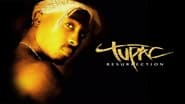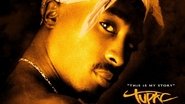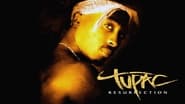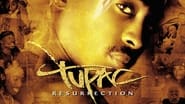Steve Pulaski
Tupac: Resurrection is made such a compelling documentary because rather than a documentarian detail the life, motives, and opinions of the late rap icon Tupac Shakur, old interview compilations, poetry excerpts, excerpts taken from Shakur's colorful music, and much more are played in order for him to tell his own life story despite no longer being with us. This provides for one of the most personal documentaries I have yet to see, especially considering that it would've been much easier to hire a narrator to analyze Shakur's upbringing, rise to fame, untold controversy, and his untimely death in 1996.When Shakur died, he left us with a plethora of content, some of which had been released, some of which would later see a release on his label Death Row Records. Tupac: Resurrection even contains some seldom-heard music from the man himself, and even emphasizes on Shakur's handwritten poetry, which describes his mother, who was a devoted Black Panther, and his father - whom he didn't know until later in his life - who was also an activist for African-Americans. Growing up in an unstable home, where violence was prominent and alternate living conditions were difficult to arrange, Shakur would often emulate the behavior of characters on sitcoms like Different Strokes, which revolved around a big, happy family - something Shakur craved.Shakur had the fortunate circumstance of being exposed to the arts and the theater when we was very young, and read and admired William Shakespeare throughout his entire life. He recognized his good fortune by seeing others in his neighborhood not even know who he was talking about when he would try to hold a conversation with them on plays, art, theater, or what-have-you. After leaving his mom's house as a teenager, Shakur looked to role models on the streets, which helped build the Shakur we know today.The film shows Tupac as a commanding, rugged philosopher, who would always emphasize the word "thug" and his personal motto "thug life." However, the way he defined "thug" was much different than the contemporary dictionary definition of the world. Shakur states that a "thug," in his mind, is a prideful underdog - somebody who has nothing but still holds their head up and works to make something. "What's the difference between me saying, 'I don't give a f***?' and Patrick Henry saying, 'Give me liberty or give me death?,' Shakur asks.Directly after the scenes where Shakur is defining "thug" show Shakur working in efforts to bring the East Coast/West Coast sides of the rap game together in a social gathering that served as a truce in the nineties. Shakur stands tall on stage, rapping his heart out, before imploring the people at the gathering to stop the violence and he'll continue to organize benefit concerts as a token for his appreciation.When Shakur explains his music, however, is when he can be a deeply contradictory figure. Despite his music both equal parts powerful and empowering, Shakur's actual music and his explanations and analysis of his music frequently seemed to come at a crossroads. This isn't as big of an issue as it may seem. Shakur, despite being rugged, tough, and thuggish (the word is employed here with his definition in mind), he was also incredibly vulnerable, and his explanations of his work reflect a more sentimental or compassionate side of him that may or may not have been an afterthought. Regardless, even his perspective on certain issues makes one think more than the average rapper today. In one scene, Shakur tells us that the only reason the Vietnam War ended was because we saw the horror that took place over there; with other wars, we kind of just assumed people were dying in a beautiful, civil way When the time comes for Shakur's brief but significant career as an actor to be discussed, one can see that through his methods of preparation and focus when portraying another character that Shakur was nothing other than a method actor, or somebody that invests in and studies their character for an ample amount of time in order to perfect a role. From his memorably gritty performance as the main antagonist in the street-drama Juice to the sweeter, softer side of him shown in the film Poetic Justice, Shakur demonstrated a diverse, character-actor mentality despite being so young and impressionable in the industry.Finally, Tupac: Resurrection looks at the controversy Shakur endured, not in the form of concerned politicians and talking heads in terms of what music their children were listening to, but how Shakur found himself wrapped up in several sexual assault cases, all of which he vehemently denied. With the aura Shakur had created about himself through his music and ideas, he proved that while you can be one of the smartest thinkers in a dangerous industry, you're still part of a very dangerous industry, which only further proved true as Shakur was shot and killed in Las Vegas in September 1996 in a drive-by shooting.Tupac: Resurrection is a fantastic display of documentary filmmaking by director Lauren Lazin, who allows Shakur to discuss ideas and topics "in his own words," so the film's tagline goes, and provide us access to a great deal of exceptional content from the man himself. It is one of the strongest, most powerful music documentaries i have yet to see.Directed by Lauren Lazin.
jofitz27
I am a fan of Tupac. Usually when rappers appear in movies they end up catastrophic (minus Friday and Boyz N The Hood) but considering there was little script and movie acting, I gave this a try. There is no doubt that Tupac was always a very intellectual and talented individual, and though he didn't piece this together, it was an interesting and thoughtful way of looking at "Thug Life".Though there should be no excuses for any violence and such demeaning phrases used towards women, Tupac uses a relatively unseen and very interesting viewpoint. "I rap about graphic violence the for the same reason people make war movies," he states. "I'm trying to make a point. Trying to show people what the ghetto is like in reality and how not to fall into that trap." Though it sounds a little contrived, interesting viewpoints like this appear throughout the movie, and we see a lighter side to the gun toting man we're all used to hearing about. He in fact was shy, and wrote poetry. One main message is blatant and cleverly true: never judge a book by its cover.However, the film has its weaknesses; it, though having no real voice-over apart from the man itself, seems rather biased. Apart from that, it is a thoughtful and interesting account of the hardship Tupac Sukur endured, which ultimately cost him his life.Final Summary: 7 out of 10
raysond
Even after his untimely death in 1996,Tupac Shakur is still cranking out hit gangsta tunes from the grave. Yes,he maybe gone from here,but still is kicking strong within the hood. This was a brilliant and excellent documentary features footage from interviews and special material about the man who would become one of the most influential rappers of all time,the one and only 2PAC. From his earliest beginnigs with his parents,who were members of the notorious Black Panther movement of the 1960's and 1970's to his childhood days growing up in parts of New York to moving to Baltimore to attend the famous Baltimore School For The Performing Arts and from there to the West Coast areas of Oakland where he would established himself within the hood as sometimes controversial,loud and proud and speaking what was on his mind about the people,the society and most of all the music industry itself that was very corrupt and distasteful. The film goes on to the times where he was on top of the throne to the rise and fall of his own empire.However,his held his own towards the troubles in his life and furthermore the trials and tribulations that would follow from the celebrities he would have encounters with including some with Arnesio Hall,Eddie Murphy,Spike Lee,The Hughes Brothers,and the final confrontation the would end his life with the East Coast/West Coast feud with rivals Biggie Smalls,P.Diddy,and mostly the head of Death Row Records Suge Knight. This film was of the best documentaries I've seen in a long while and it really kept me in tune to a individual who was not just about rapping about the thug life of drugs,guns,violence and women,but he was a poet/activist,and actor in his own right--a man whose thoughts about society as an a black man living in America and how the black man is mistreated is something to see,since 2PAC was large and had fans worldwide. The documentary is a must see.





